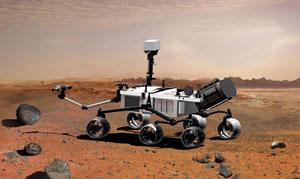Ever-growing cost of the planned Mars Science Laboratory threatens other space missions.
 Cost estimates for the Mars Science Laboratory have risen again.NASA
Cost estimates for the Mars Science Laboratory have risen again.NASAThe Mars Science Laboratory (MSL), NASA's souped-up 1-tonne rover due for launch in 2011, needs yet more money. The latest budget overrun could for the first time delay other missions in the agency's cash-strapped planetary-science division.
The rover's latest price tag is US$2.286 billion — 40% more than the official $1.63-billion estimate made in 2006. But even that will not be enough. In a 'breach report' due to be handed to the US Congress by the end of July, NASA will report that the troublesome mission, now also called Curiosity, needs $15–115 million more on top of the $2.286-billion estimate.
NASA has so far avoided delays and cancellations to other missions by raiding technology-development funds within the Mars programme. But officials are now considering delays to two planned Moon missions.
"The time for some tough decisions is here," said NASA science chief Ed Weiler. He broke the news to planetary scientists at an advisory-committee meeting on 9 July at NASA headquarters in Washington DC, along with Jim Green, director of the planetary science division, and Mars programme chief Doug McCuistion.
Slippery issue
The cause of the latest overrun is problems with motors, gearboxes and avionics controls. After switching from a dry to a wet lubricant, engineers have had trouble verifying the reliability of motors for the rover's robotic arm. Moreover, McCuistion says, a new snag was recently discovered: some of the premier instruments — the Sample Analysis at Mars or SAM instrument set — will suck twice as much power as was expected, and that means the rover needs to carry bigger batteries.
“Where's it going to end?”
Clive Neal
University of Notre Dame
McCuistion says he won't have confidence in the estimates for the rover's latest needs until November, when an independent cost estimate is finished. If the additional costs stay towards the $15-million end of the spectrum, McCuistion and Green think they can keep the pain within the Mars programme, by cutting money for later Mars missions in 2016, 2018 and 2020.
But if the extra costs rise toward $115 million, the agency may have to delay the Lunar Atmosphere and Dust Environment Explorer, a small orbiter due to be launched in 2012, and the International Lunar Network, a planned system of robotic lunar research stations. The agency could also delay work on New Frontiers, a planned $870-million programme of missions to many Solar-System destinations that has just begun accepting competitive proposals.
"Where's it going to end?" asks Clive Neal, a planetary scientist at the University of Notre Dame in Indiana and chair of NASA's Lunar Exploration Analysis Group. "Everything is getting sick because of one mission. And I'm not happy with that."
Too big to fail?
Like many bloated scientific endeavours, however, the MSL may be too big to fail. In January, after NASA decided to delay the rover's launch from 2009 to 2011, the planetary-science advisory committee was presented with a shocking, but presumed final, $400-million overrun. The committee recommended that NASA press ahead with the mission and try to limit cuts to the Mars programme.
At the Jet Propulsion Laboratory in Pasadena, California, the project manager, Richard Cook, was replaced by Peter Theisinger, a former project manager for the Mars rovers Spirit and Opportunity. McCuistion says he will order an independent "lessons learned" investigation in 2010.
By then the extent of the damage to NASA's long-term plans may be known. Weiler says that it looks like the agency may not be able to be able to afford a 2020 launch of a major mission to Jupiter's moon Europa. With Mars technology budgets decimated, a Mars Sample Return mission is moving even further down the schedule. Such a mission, which would cost $6–8 billion, isn't likely to start until around 2024, says Weiler.



No comments:
Post a Comment